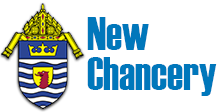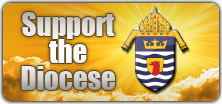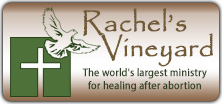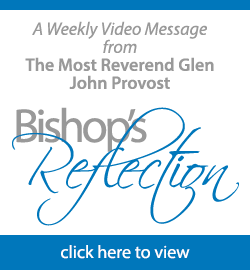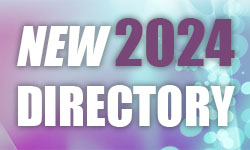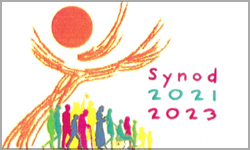(USCCB News Archives can be accessed at www.usccb.org/news/)
December 20, 2024
Pope Francis Appoints Bishop Gregory Kelly as Bishop of Tyler
Pope Francis Appoints Bishop Gregory Kelly as Bishop of Tyler
WASHINGTON — Pope Francis has appointed Most Reverend J. Gregory Kelly, auxiliary bishop of the Diocese of Dallas, as Bishop of Tyler. The appointment was publicized in Washington, D.C. on December 20, 2024, by Cardinal Christophe Pierre, apostolic nuncio to the United States.
The biography for Bishop Kelly may be found here.
The Diocese of Tyler is comprised of 23,443 square miles in the State of Texas and has a total population of 1,460,387, of which 121,212 are Catholic.
December 20, 2024
Pope Francis Names New Auxiliary Bishops of Chicago
Pope Francis Names New Auxiliary Bishops of Chicago
WASHINGTON — Pope Francis has appointed Rev. Timothy O’Malley, Very Rev. Lawrence J. Sullivan, Rev. José Maria Garcia Maldonado, Rev. Robert Fedek, and Rev. John S. Siemianowski, as auxiliary bishops of Chicago. The appointments were publicized in Washington, D.C. on December 20, 2024, by Cardinal Christophe Pierre, apostolic nuncio to the United States.
Bishop-elect O’Malley is a priest of the Archdiocese of Chicago and currently pastor of Most Blessed Trinity parish, in Waukegan. Bishop-elect Sullivan is a priest of the Archdiocese of Chicago, currently serving as interim episcopal vicar for Vicariate VI, interim priest director of Catholic Cemeteries, and pastor of Christ the King parish in Chicago. Bishop-elect Maldonado is a priest of the Archdiocese of Chicago, currently serving as pastor of San José Sanchez del Rio parish in Chicago. Bishop-elect Fedek is a priest of the Archdiocese of Chicago, currently serving as the assistant to the Cardinal Archbishop of Chicago. Bishop-elect Siemianowski is a priest of the Archdiocese of Chicago, currently serving as pastor of Saint Juliana parish in Chicago.
The following biographical information for the bishops-elect were drawn from preliminary materials provided to the U.S. Conference of Catholic Bishops:
Bishop-elect Timothy O’Malley
Reverend Timothy O’Malley was born December 17, 1959, in Evergreen Park, Illinois. He received a bachelor’s degree in business administration from Purdue University (1982) and a Certified Public Accountant through the University of Illinois (1983). He earned a Juris Doctor from DePaul University Law School in 1989. After working as an accountant (1982-1987) and practicing law (1990-1992), he attended Mundelein Seminary (1992-1997) and earned a bachelor’s in sacred theology and a master of divinity. He was ordained to the priesthood on May 24, 1997.
Father O’Malley’s pastoral assignments include: associate pastor at Saint Agnes of Bohemia parish in Chicago (1997-2002); pastor of Saint James parish in Highwood (2002-2007); pastor of Saint James parish in Round Lake (2007-2015); and pastor of Saint Genevieve parish in Chicago (2015-2018). He has served as pastor of Most Blessed Trinity parish in Waukegan since 2018.
His other diocesan assignments include: member of the Priest Placement Board (2014-2018); dean of Deanery IV C (2015-2018), Deanery IV A (2017-2018), and Deanery I B (2019-present). Father O’Malley speaks English and Spanish.
Bishop-elect Lawrence J. Sullivan
Very Reverend Lawrence J. Sullivan was born January 22, 1966, in Chicago, Illinois. He earned a bachelor of arts in political science from the Nile College Seminary of Loyola University, Chicago, in 1988. He completed a master of arts in theology at Mundelein Seminary in 1992 and earned a master of science in ecclesial management from The Catholic University of America in Washington, D.C., in 2019. He was ordained to the priesthood on May 23, 1992.
Father Sullivan’s pastoral assignments include: associate pastor at Saint Celestine parish in Elmwood Park (1992-1999); pastor of Saint Celestine parish in Elmwood Park (1999-2008); pastor of Saint Christina parish in Mount Greenwood (2008-2014). He currently serves as pastor of Christ the King parish in Beverly, and as interim episcopal vicar for the Vicarate VI of the archdiocese, and as interim priest director of Catholic Cemeteries of the Archdiocese of Chicago.
His diocesan assignments include: associate priest director (2013-2017) and interim priest director (2017-present) of Catholic Cemeteries of the Archdiocese of Chicago; interim episcopal vicar for Vicariate VI of the Archdiocese of Chicago (2023-present); member of the archdiocesan school board (2015-present); member and vice-chair of the presbyteral council; and member of the college of consultors.
Bishop-elect José Maria Garcia Maldonado
Reverend José Maria Garcia Maldonado was born on March 24, 1979, in San Julian, Jalisco, Mexico. He attended the Minor Seminary of the Diocese of San Juan de los Lagos and completed an introductory program in Arandas, Jalisco, before entering the local major seminary. In August 2001, he immigrated to the United States. He entered the Casa Jesus Program in Chicago in 2002 and completed his studies at Mundelein Seminary, earning a masters in divinity in 2008. He was ordained to the priesthood on May 17, 2008.
Father Garcia’s pastoral assignments include: associate pastor at Saint Sylvester parish in Chicago (2009-2010); director of the Our Lady of Guadalupe Shrine in Des Plaines (2010-2011); staff member at Saint Joseph College Seminary in Chicago (2010-2011); administrator and pastor at Good Shepherd parish in Chicago (2012-2021); administrator of Our Lady of Tepeyac parish in Chicago (2018). Since 2021 he has served as pastor of San José Luis Sanchez del Rio parish in Chicago.
His diocesan assignments include: director of vocations at Saint Joseph Seminary College (2010); member of the presbyteral council (2014-2021); member of the college of consultors (2014-2021); dean of Deanery C in Vicariate IV (2021-2023); and dean of Deanery A in Vicariate IV (2023). Father Garcia speaks English and Spanish.
Bishop-elect Robert Fedek
Reverend Robert Fedek was born on July 17, 1979, in Bielsko-Biala, Poland. He attended the Archdiocesan Theological Seminary in Krakow, Poland, from 1998 to 2001, and continued his studies at the Abramowicz Preparatory Seminary and Mundelein Seminary, earning a masters in divinity in 2005. He was ordained to the priesthood on May 21, 2005.
Father Fedek’s pastoral assignments include: associate pastor at Saint Mary of the Annunciation parish in Chicago (2005-2010); pastor of Our Lady of Victory parish in Mundelein (2010-2017); pastor of Immaculate Conception parish in Chicago (2017-2020). Since 2020, he has served as administrative secretary to the Cardinal Archbishop of Chicago.
Bishop-elect Fedek’s diocesan assignments include: assistant vocation director for Vicariate I (2007-2010); and coordinator of the Polish Ministry Council (2015-2018). Father Fedek speaks English and Polish.
Bishop-elect John S. Siemianowski
Reverend John Steven Siemianowski was born on May 26, 1960, in Chicago, Illinois. He earned a bachelor of science degree and a Secondary Education Certificate from Southern Illinois University, Edwardsville, in 1982. Before entering seminary, he worked as a teacher at Saint Joseph Catholic School from 1982 to 1984. He attended Mundelein Seminary and earned a masters in divinity in 1989. He was ordained to the priesthood on May 20, 1989.
Father Siemianowski’s pastoral assignments include: associate pastor at Saint Francis de Sales parish in Lake Zurich (1989-1990); associate pastor at Saint Mary parish in Buffalo Grove (1990-1993); associate pastor at Saint Elizabeth Seton parish in Orland Hills (1993-1996); pastor of Saint Agnes parish in Chicago Heights (1996-2001); administrator and later pastor of Saint Paul parish in Chicago (2003-2010); pastor of Saint Kieran parish in Chicago (2013-2021); and pastor of Saint Juliana parish in Chicago (2021-present).
His diocesan assignments include: member of the Priest Placement Board (1994-1998) and executive secretary of the Priest Placement Board (2019-2022). Father Siemianowski speaks English and Spanish.
The Archdiocese of Chicago is comprised of 1,411 square miles in the State of Illinois and has a total population of 5,939,000 of which 2,079,000 are Catholic.
December 11, 2024
Reflection on Our Lady of Guadalupe
Reflection on Our Lady of Guadalupe
WASHINGTON – “With one clear voice, we reaffirm our unwavering and unqualified recognition of the fact that each and every human life is sacred, that all persons are imbued by God with an inviolable dignity, which no earthly power can deny.” The Catholic Church commemorates the Feast of Our Lady of Guadalupe, patroness of the Americas on December 12. Besides this Marian feast day and devotion to the Blessed Mother carrying special significance for many immigrants in the United States, Our Lady of Guadalupe is also known as patroness of the unborn after appearing to Saint Juan Diego as a pregnant mother. Invoking her intercession, the following reflection was authored by several chairmen of committees of the U.S. Conference of Catholic Bishops (USCCB):
“Though we so often distinguish ourselves through borders, races, languages, political ideals, and so many other possible sources of division, Our Lady’s patronage is a powerful reminder that we are all called to be one in Christ Jesus, beginning from the moment of our conception. At this time, when some of our brothers and sisters are experiencing fear and anxiety, we are reminded of the abiding words of Our Lady to Saint Juan Diego: ‘Do not fear any illness or vexation, anxiety or pain. Am I not here, I who am your Mother? Are you not under my shadow and protection?’“Throughout the life of our nation, we have seen at times unacceptable demonstrations of prejudice and hatred, including in recent days mass communications targeting people of color and disparaging comments about immigrant communities. With one clear voice, we reaffirm our unwavering and unqualified recognition of the fact that each and every human life is sacred, that all persons are imbued by God with an inviolable dignity, which no earthly power can deny. The sinful ideologies of racism and xenophobia are antithetical to these core teachings of our Christian faith. No person formed by and committed to the Gospel of Life can harbor such views in good conscience.“We beseech you, Blessed Mother: May the same love you radiated in the presence of Saint Juan Diego nearly five hundred years ago penetrate the heart of every man, woman, and child in our nation, creating in each one of us a profound and unrelenting awareness of our shared humanity. Intercede for us with your Son, Jesus, whom you brought forth from your womb to shine as the Light of the World. Envelop us in the comfort of your mantle, bringing forth the peace, hope, and healing that is so desperately needed in our age.”
This reflection on the Feast of Our Lady of Guadalupe was shared by Bishop Mark Seitz of El Paso, chairman of the USCCB’s Committee on Migration; Bishop Daniel E. Thomas of Toledo, chairman of the Committee on Pro-Life Activities; Bishop Eusebio L. Elizondo, auxiliary bishop of Seattle and chairman of the Subcommittee on the Pastoral Care of Migrants, Refugees, and Travelers; and Bishop Joseph N. Perry, auxiliary bishop emeritus of Chicago and chairman of the Ad Hoc Committee Against Racism.
December 11, 2024
New Glossary Breaks Ground in Tackling Antisemitism Through Catholic Lens
New Glossary Breaks Ground in Tackling Antisemitism Through Catholic Lens
NEW YORK — Today, as part of ongoing and broader efforts to counter antisemitism across society, American Jewish Committee (AJC), in partnership with the United States Conference of Catholic Bishops’ (USCCB) Committee on Ecumenical and Interreligious Affairs, released Translate Hate: The Catholic Edition. This groundbreaking resource paves the way for deeper and wider cooperation in a shared commitment to eradicating antisemitism at a time when recent events have challenged Catholic-Jewish relations.
Translate Hate: The Catholic Edition features Catholic commentary on various entries of AJC’s renowned Translate Hate glossary of antisemitic terms, themes, and memes. It comes as Catholic and Jewish communities prepare to mark six decades of trust-building and mutual learning beginning when the Catholic Church reached out to the Jewish people and the world with Nostra Aetate, the historic Second Vatican Council document disseminated on October 28, 1965, which dramatically and publicly decried antisemitism and transformed the Church’s approach to the Jewish people for the better.
“For sixty years, dialogue has helped to establish lasting friendship among leaders in the Catholic and Jewish communities,” said Bishop Joseph C. Bambera of Scranton, chairman of the USCCB’s Committee on Ecumenical and Interreligious Affairs. “As we prepare to mark the 60th anniversary of Nostra Aetate, it is more important than ever to renew our commitment to stand with our Jewish brothers and sisters against all forms of antisemitism. Sadly, we are currently witnessing a tragic rise in antisemitic incidents both globally and here in the United States, a painful reminder that our work is not done. This project is but one example of the fruits of our collaboration that we hope will have wide-ranging impact as Catholics and Jews continue building bridges and combat antisemitism together.”
Translate Hate: The Catholic Edition is the product of investment in Catholic and Jewish leadership dialogue. It is the latest, but not the last, installment in deepening and extending the infrastructure, educational tools, and reach of Catholic-Jewish relations.
“This Catholic edition of Translate Hate is a groundbreaking project for Catholic-Jewish relations and could not come at a more needed time, as we are experiencing the most dramatic rise in antisemitism since the Holocaust, including notably in the United States,” said Rabbi Noam Marans, AJC Director of Interreligious Affairs. “USCCB’s allyship and leadership in confronting antisemitism as a threat not only to the Jewish people but also to civilized society more broadly is a key part of the national whole-of-society approach we need to combat anti-Jewish hate. We are proud to partner with USCCB and support its ‘The Fruit of Dialogue: Catholics Confronting Antisemitism’ initiative. The path inaugurated by Nostra Aetate must continuously be renewed and this USCCB partnership with AJC is a reaffirmation of that commitment.”
As with the original Translate Hate, the Catholic edition will be flexible and updated with more Catholic commentaries, even as the glossary list of antisemitic terms expands.
“Like the versions that came before it, we hope that Translate Hate: The Catholic Edition will help equip Catholics, Jews, and others with the tools needed to recognize antisemitism,” said Holly Huffnagle, AJC U.S. Director for Combating Antisemitism. “The first step in combating antisemitism is being able to understand and identify it. Translate Hate: The Catholic Editionpresents this information in a way that can be used at all levels of Catholic and Jewish formal and informal education and empower our partners to stand up to anti-Jewish hate.”
December 10, 2024
Grants Seek to Bring Gospel to the Poor, Vulnerable, and Oppressed
Grants Seek to Bring Gospel to the Poor, Vulnerable, and Oppressed
WASHINGTON — “Catholics across the United States help strengthen the faith and bring the Good News of Jesus to the poor, vulnerable, and oppressed,” said Bishop Daniel H. Mueggenborg of Reno, chairman of the Committee on National Collections for the U.S. Conference of Catholic Bishops (USCCB). The bishops who serve on the five subcommittees of the Committee on National Collections met recently and awarded nearly 500 grants totaling more than $19.5 million to further the mission of Jesus Christ and provide support to some of the most impoverished and marginalized people in the United States and around the world.
The grants awarded by these program subcommittees were made possible by parishioners’ donations to five annual collections:
-
The Catholic Campaign for Human Development
-
The Catholic Home Missions Appeal
-
The Collection for the Church in Central and Eastern Europe
-
The Collection for the Church in Latin America
-
The Solidarity Fund for the Church in Africa
“The grants made possible through these national collections embody the spirit of what Pope Francis called for when he designated the Jubilee 2025 with the theme 'Pilgrimage of Hope,'” Bishop Mueggenberg said. “This Jubilee year is a special opportunity for the Catholic faithful to share the hopeful message of the Gospel with the world. In that spirit of hope and through their generosity to the national collections, Catholics support pastoral ministries to prisoners and refugees, training for lay leaders, and the Church’s efforts to build peace in lands affected by war and oppression,” he said.
Funded projects range from support for ministries and priestly vocations in the mission dioceses of the United States and its territories, as well as the economic and community development work of grassroots organizations working to combat poverty in neighborhoods across the country. This concern for the poor and marginalized extends overseas with support for efforts to stop human trafficking in the Horn of Africa, helping Catholic sisters care for war victims in Ukraine, and rebuilding a hurricane-ravaged church in Cuba.
December 10, 2024
Bishop Zaidan on Political Transition and Beginning of New Chapter in Syria
Bishop Zaidan on Political Transition and Beginning of New Chapter in Syria
WASHINGTON — The United States and the international community should assist Syria as it “starts a new chapter in its rich history,” said Bishop A. Elias Zaidan of the Maronite Eparchy of Our Lady of Lebanon, chairman of the U.S. Conference of Catholic Bishops’ Committee on International Justice and Peace.
“In yet another dramatic development in the Middle East, after enduring more than a decade of bloody civil war, Syria is undergoing a national political transition that will surely impact the entire region. Cardinal Mario Zenari, Apostolic Nuncio in Syria, expressed his profound relief that the transition was relatively peaceful, while also noting the arduous task ahead for the Syrian people saying, ‘Thank God, this transition happened without bloodshed, without the carnage that was feared. Now the path ahead is steep—those who have taken power have promised to respect everyone and to build a new Syria. We hope they will keep these promises, but of course, the road ahead remains very difficult.’
“I echo Cardinal Zenari’s sentiments on the transition and the aspirations of the Syrian people are clear: the people of Syria want a government in Damascus that will respect and defend human rights, especially the religious freedom of minorities, uphold the rule of law, and promote economic and civil society development throughout the country. As Syria starts a new chapter in its rich history, I urge the United States and the international community to keep the people of Syria in prayer and to closely monitor the situation so that all aid organizations are able to reach those most in need.”
December 5, 2024
USCCB President on Anniversary of Ukraine’s Voluntary Relinquishing of Nuclear Arsenal
USCCB President on Anniversary of Ukraine’s Voluntary Relinquishing of Nuclear Arsenal
WASHINGTON — Most Reverend Timothy P. Broglio of the Archdiocese for the Military Services, USA, and president of the U.S. Conference of Catholic Bishops has issued a statement commemorating the thirtieth anniversary of Ukraine’s voluntary relinquishing of its nuclear arsenal, highlighting the country’s courage in envisioning a world free of nuclear weapons.
“Thirty years ago today, on December 5, 1994, in a truly prophetic gesture in favor of global peace, Ukraine voluntarily relinquished its nuclear arsenal, the third largest in the world at that time. The Russian Federation, the United States, and the United Kingdom pledged to respect the ‘independence, sovereignty, and the existing borders of Ukraine.’ France and China variously echoed these promises. Unfortunately, this pledge was broken by the Russian annexation of Crimea in 2014 and the invasion in 2022. As the bitter conflict rages, with mounting civilian deaths and widespread displacement, we commemorate the time when the Ukrainian people opted for life, liberty, and peace, courageously envisioning a world free of nuclear weapons.
“Recently, as Ukraine marked 1,000 days since the invasion began, Pope Francis wrote to the Apostolic Nuncio in Ukraine, Archbishop Visvaldas Kulbokas, to express his solidarity with the suffering people of Ukraine. We join our Holy Father in reaffirming his call for peace when he said, ‘It is this word – peace – unfortunately forgotten by the world today, that we would like to hear resound in the families, homes, and squares of dear Ukraine.’”
November 27, 2024
Ceasefire Between Israel and Hezbollah a Source of “Profound Hope”
Ceasefire Between Israel and Hezbollah a Source of “Profound Hope”
WASHINGTON — News of a ceasefire between Israel and Hezbollah was received with “profound hope” by Bishop A. Elias Zaidan of the Maronite Eparchy of Our Lady of Lebanon, chairman of the U.S. Conference of Catholic Bishops’ Committee on International Justice and Peace.
“It is in a spirit of profound hope that I welcome news that, after more than a year of fighting and thousands of deaths, a ceasefire has been agreed upon by Israel and Hezbollah, beginning today, Wednesday, November 27. I am grateful for the crucial, peacebuilding role that the United States has played in this development in Lebanon and Israel. As we rejoice in this opportunity for peace to take root, I urge all parties, as well as the broader international community, to remain vigilant and to continue working toward the consolidation of peace in the region through the disarmament of Hezbollah and the full implementation of the UN resolutions concerning Lebanon; this will lead to Lebanon regaining its full sovereignty and independence.
“I pray that this ceasefire proves to be a beacon of real hope, and that it inspires greater ambitions for a lasting peace in the Middle East on all fronts, especially in the dire situation in Gaza. I join in solidarity with Pope Francis, who, in October, called for a ceasefire, saying: ‘Let us pursue the paths of diplomacy and dialogue to achieve peace.’”
November 22, 2024
Nationwide Prayer Vigil for Life Planned January 23-24
Nationwide Prayer Vigil for Life Planned January 23-24
WASHINGTON — “I enthusiastically invite Catholics from all around the country to join me in-person or virtually, in praying for an end to abortion and building up a culture of life,” said Bishop Daniel E. Thomas of Toledo, chairman of the U.S. Conference of Catholic Bishops’ (USCCB) Committee on Pro-Life Activities. The faithful are invited to observe a nationwide prayer vigil from Thursday, January 23 to Friday, January 24, 2025, and encouraged to pray for an end to abortion and a greater respect for all human life in post-Roe America.
In 2022, the Supreme Court of the United States issued its decision Dobbs vs. Jackson which overturned the 1973 Roe v. Wade decision that legalized abortion nationwide. Since the Dobbsdecision, abortion policy is now determined at the state and federal levels. Some states have increased access to abortion and others are working to ensure stronger policies to protect preborn children and their mothers.
“Together, we must pray to change hearts and build a culture of life as we advocate for the most vulnerable. I look forward to opening our Vigil with Holy Mass together with many other bishops, hundreds of priests, consecrated religious, seminarians, and many thousands of pilgrims,” said Bishop Thomas.
The National Prayer Vigil for Life is hosted each January by the USCCB’s Pro-Life Secretariat, the Basilica of the National Shrine of the Immaculate Conception in Washington, D.C., and The Catholic University of America’s Office of Campus Ministry. The vigil has always taken place on the eve of the March for Life, which marks the date of the historic 1973 Roe v. Wade decision.
The Opening Mass will take place in the Great Upper Church at the Basilica of the National Shrine of the Immaculate Conception in Washington, D.C. from 5:00-7:00 PM on Thursday, January 23. The principal celebrant and homilist for the Opening Mass will be Bishop Thomas.
After the Mass, there will be a Eucharistic Procession immediately followed by a National Holy Hour for Life, which will include Recitation of the Rosary and Benediction. The Opening Mass and Holy Hour of the National Prayer Vigil for Life will be broadcast on various Catholic networks and will be livestreamed on the Basilica’s website at www.nationalshrine.org/mass.
The vigil concludes at 8:00 AM on Friday, January 24 with the Closing Mass celebrated by Bishop Robert J. Brennan of Brooklyn.
The full schedule of the 2025 National Prayer Vigil for Life is listed below. (All times are in Eastern Time.)
Thursday, January 23:
4:45 PM Chaplet of Divine Mercy
5:00 PM Opening Mass with Bishop Thomas
7:00 PM Holy Hour for Life
4:45 PM Chaplet of Divine Mercy
5:00 PM Opening Mass with Bishop Thomas
7:00 PM Holy Hour for Life
Friday, January 24:
8:00 AM Closing Mass with Bishop Brennan
The live television broadcasts on January 23 from 5:00-8:00 PM and on January 24 from 8:00-9:00 AM will be provided by the Eternal Word Television Network (EWTN) and will be available via live-stream on the Basilica’s website. For more information about on-site attendance at the Basilica for the National Prayer Vigil for Life, please visit the information page on the Basilica’s website.
November 14, 2024
Recap of U.S. Bishops’ Fall Plenary in Baltimore
Recap of U.S. Bishops’ Fall Plenary in Baltimore
BALTIMORE — The United States Conference of Catholic Bishops (USCCB) gathered for their Fall Plenary Assembly in Baltimore, November 11-14. The bishops began their plenary in prayer at the Baltimore Basilica and as the public session of the assembly began, they sent a message to the Holy Father, followed by an address by Cardinal Christophe Pierre, papal nuncio to the United States. Archbishop Timothy P. Broglio of the Archdiocese for the Military Services, USA, and president of the USCCB, also addressed the bishops.
Attending the plenary as a special guest was Bishop Stepan Sus, auxiliary and curial bishop to the head of the Ukrainian Greek-Catholic Metropolitan of Kyiv-Halych, who shared his testimony of the Church in Ukraine in the midst of war. Bishop Roy E. Campbell, auxiliary bishop of Washington and president of The National Black Catholic Congress (NBCC) gave a brief presentation to the body on the history, mission and programs of the NBCC. And as the universal Catholic Church prepares to celebrate the Jubilee Year 2025, Sister Maria Juan Anderson, a Religious Sister of Mercy of Alma, Michigan, who currently serves as the coordinator for the Bishops’ Office for United States Visitors to the Vatican, shared information about her office and the services they provide to pilgrims visiting Rome. Mr. Patrick Kelly, Supreme Knight of the Knights of Columbus, provided an update on the Order’s Cor initiative.
The bishops received a report on the 2021-2024 Synod of Bishops that concluded in Rome last month; a report on the Eucharistic revival initiative and the National Eucharistic Congress held this summer; and an update on the interim implementation of Antiquum Ministerium (on the ministry of the catechist). An update was also given on the Catholic Campaign for Human Development (CCHD) as a follow up to the discussion the bishops had at their June plenary on the best way that the CCHD could continue the vital work of fighting poverty. The bishops’ migration committee chairman gave an update on the work of the committee, which aims to help reshape the national narrative on migration to be more welcoming and responsive to the needs of migrants and to help the faithful better understand Catholic teaching on migration. A presentation was also given on the resources available for diocesan and parish leaders in applying the Vatican’s declaration, Dignitas Infinita (on human dignity) to the specific cultural context of the United States; this effort is an ongoing collaboration among several committees of the USCCB.
Exemplifying synodality, the bishops engaged in a table discussion during the public session on the pastoral implementation of integral ecology and Laudato si’. Specifically, they were provided with prompts to discuss how best to mark the tenth anniversary of Laudato si’. The table discussions were enhanced by the adjustment to bishops’ seating made during the November 2022 plenary to more naturally accommodate fraternal dialogue. While a summary of the discussions was not provided publicly during the plenary, the reports from each bishop group will be used to guide the work of Conference committees.
The bishops also approved the Committee on Laity, Marriage, Family Life and Youth to move forward with the drafting of a document to guide lay ecclesial ministry, which is meant to be a follow-up to the bishops’ 2005 document, Coworkers in the Vineyard of the Lord; the action item was passed with 223 votes in favor, 9 votes against, and 6 abstentions. The bishops also voted to pass the USCCB’s 2025 budget (226 votes in favor, 3 votes against, and 4 abstentions), and on the USCCB’s 2025-2028 Mission Directive, which will guide the work of the Conference staff over the next three years (225 votes in favor, 7 votes against, and 2 abstentions).
During their meeting, the bishops voted for a new treasurer and new chairmen of five standing committees. All six elected bishops will serve for one year as the chairman-elect before beginning a three-year term that begins at the conclusion of the bishops’ 2025 Plenary Assembly. They also held a consultation on advancing the causes for beatification and canonization for Sister Annella Zervas, a professed religious of the Order of Saint Benedict, and of the Servant of God Gertrude Agnes Barber, a lay woman, and by voice vote, they affirmed the advancement of both causes at the local levels.
The bishops discussed and voted on three action items related to liturgical texts, presented by the USCCB’s Committee on Divine Worship:
-
The bishops voted 216 votes in favor, 4 votes against, and 3 abstentions to approve the revised New American Bible for liturgical use. The approval of this requires a two-thirds vote of the Latin Church members, with subsequent confirmatio from the Vatican’s Dicastery for Divine Worship and the Discipline of the Sacraments.
-
The bishops voted 220 in favor, 2 votes against, and 1 abstention to approve the International Commission on English in the Liturgy (ICEL) Gray Book of The Order of Crowning of an Image of the Blessed Virgin Mary. The approval of this requires a two-thirds vote of the Latin Church members, with subsequent confirmatio by the Vatican’s Dicastery for Divine Worship and the Discipline of the Sacraments.
-
The bishops voted 213 in favor, 1 vote against, and 9 abstentions to approve the Liturgia de las Horas: Textos propios y adaptaciones para las diócesis de los Estados Unidos de América. The approval of this requires a two-thirds vote of the Latin Church members, with subsequent recognitio by the Vatican’s Dicastery for Divine Worship and the Discipline of the Sacraments.
November 12, 2024
U.S. Bishops Affirm Advancement of Cause of Beatification and Canonization of the Servant of God Dr. Gertrude Barber
U.S. Bishops Affirm Advancement of Cause of Beatification and Canonization of the Servant of God Dr. Gertrude Barber
BALTIMORE — At their November Plenary Assembly, the bishops of the United States held a canonical consultation on the cause of beatification and canonization of the Servant of God Dr. Gertrude A. Barber.
Bishop Thomas John Paprocki of Springfield, chairman of the U.S. Conference of Catholic Bishops’ (USCCB) Committee on Canonical Affairs and Church Governance, and Bishop Edward M. Lohse of Kalamazoo and a member of the same committee, facilitated the presentation of the cause to the bishops. With 205 votes in favor, 6 votes against, and 19 abstentions, the bishops affirmed their support for the advancement of the cause of beatification and canonization at the local level.
A brief biography of Dr. Gertrude Barber was provided by the Diocese of Erie:
Dr. Gertrude Agnes Barber was born in Erie, Pennsylvania, on September 16, 1911. After the death of her father during the 1918 flu pandemic, her eldest brother left school to support the family, ensuring his siblings could continue their education – a sacrifice that had profound impact on Gertrude’s lifelong advocacy of education.
She earned a bachelor’s degree from Pennsylvania State University and began her career as a teacher in the Erie School District in 1931. While teaching, she continued her education, earning a master’s and doctoral degree in education, becoming a school psychologist and administrator. Her work with children with special needs profoundly impacted her and in 1952 she opened her first class for children with intellectual disabilities. Dr. Barber’s mission expanded throughout her career, opening the first home for children with disabilities in 1958. In 1971, she left the Erie School District to lead an organization serving individuals of all ages, providing care for children from 24 area school districts, adult training and job placement services, group homes and recreational programs, a retirement center for adults in their senior years, and mental health support services.
Dr. Barber passed away on April 29, 2000, but her legacy continues through the Barber National Institute, which provides services to thousands of children and adults with autism, intellectual, and physical disabilities and behavioral health challenges and their families across Pennsylvania.
The cause of beatification and canonization of the Servant of God Dr. Gertrude A. Barber was formally opened by Bishop Lawrence T. Persico of Erie in December 2019.
November 12, 2024
U.S. Bishops Affirm Advancement of Cause of Beatification and Canonization of Sister Annella Zervas, OSB
U.S. Bishops Affirm Advancement of Cause of Beatification and Canonization of Sister Annella Zervas, OSB
BALTIMORE — At their November Plenary Assembly, the bishops of the United States held a canonical consultation on the cause of beatification and canonization of Sister Annella Zervas, a professed religious of the Order of Saint Benedict.
Bishop Thomas John Paprocki of Springfield, chairman of the U.S. Conference of Catholic Bishops’ (USCCB) Committee on Canonical Affairs and Church Governance, and Bishop Andrew H. Cozzens of Crookston, facilitated the presentation of the cause to the bishops. With 206 votes in favor, 7 votes against, and 11 abstentions, the bishops affirmed their support for the advancement of the cause of beatification and canonization at the local level.
A brief biography of Sister Annella Zervas was provided by the Diocese of Crookston:
Anna Cordelia Zervas was born on April 7, 1900, in Moorhead, Minnesota. From a young age, she exhibited a deep devotion to the Eucharist and prayer and attended Mass daily. At age fifteen, she entered the convent of the Benedictine Sisters in St. Joseph, Minnesota. She received the Benedictine habit in 1918, receiving the name Sister Mary Annella, made her simple profession in July 1919, and her solemn profession in July 1922. Sister Annella was known for her devotion to the Eucharist and the Virgin Mary, as well as for her kindness, generosity, sense of humor, musical talent and artistic abilities.
About a year after her solemn profession, Sister Annella began suffering from a severe, undiagnosable illness. The illness was marked with extreme physical suffering that eventually prevented her from living in the monastery and forced her to return to her family for care. Despite the pain, Sister Annella maintained unwavering faith and joy, and she focused on the spiritual welfare of others, inspiring others with her kindness and calm. Holy Communion was her greatest consolation in her suffering, and she trusted that God had a special reason for her suffering, and that He would bring it to an end when He wished, remarking, “I am buying my ticket for eternity, and it is well worth the price.”
Sister Annella passed away on August 14, 1926, at the age of 26. She is remembered as an “apostle of suffering for our day,” with her life serving as a testament to radical trust in God and full obedience to His holy will. Central to Sister Annella’s legacy is her belief that the Eucharist is life’s greatest consolation, teaching the importance of recognizing God’s true presence in this sacrament. Her life serves as an example of profound trust and obedience, offering a model of holiness for Catholics around the world.
November 12, 2024
USCCB Elects Treasurer and Committee Chairmen at Fall Plenary Assembly
BALTIMORE — At their Fall Plenary Assembly in Baltimore, the U.S. Conference of Catholic Bishops (USCCB) voted for a Conference treasurer and chairmen for five standing committees. The Conference treasurer also serves as the chairman of the Committee on Budget and Finance. All six bishops will serve for one year as chairmen-elect before beginning a three-year term at the conclusion of the bishops’ 2025 Fall General Assembly.
USCCB Elects Treasurer and Committee Chairmen at Fall Plenary Assembly
BALTIMORE — At their Fall Plenary Assembly in Baltimore, the U.S. Conference of Catholic Bishops (USCCB) voted for a Conference treasurer and chairmen for five standing committees. The Conference treasurer also serves as the chairman of the Committee on Budget and Finance. All six bishops will serve for one year as chairmen-elect before beginning a three-year term at the conclusion of the bishops’ 2025 Fall General Assembly.
The bishops elected as chairmen-elect are:
Archbishop Bernard A. Hebda of Saint Paul and Minneapolis, as treasurer-elect, and chairman-elect of the Committee on Budget and Finance in a 156-84 vote over Bishop David J. Malloy of Rockford.
Bishop Ronald A. Hicks of Joliet, as chairman-elect of the Committee on Clergy, Consecrated Life, and Vocations in a 146-94 over Bishop Juan Miguel Betancourt, SEMV, auxiliary bishop of Hartford.
Bishop Michael G. Woost, auxiliary bishop of Cleveland, as chairman-elect of the Committee on Divine Worship in a 128-112 over Archbishop Alexander K. Sample of Portland in Oregon.
Archbishop Shelton J. Fabre of Louisville, as chairman-elect of the Committee on Domestic Justice and Human Development in a 158-81 over Bishop Kevin J. Sweeney of Paterson.
Bishop Edward J. Burns of Dallas as chairman-elect of the Committee on Laity, Marriage, Family Life and Youth in a 147-91 over Bishop James D. Conley of Lincoln.
Bishop Brendan J. Cahill of Victoria as chairman-elect of the Committee on Migration in a 155-85 over Bishop Joseph J. Tyson of Yakima.
November 6, 2024
U.S. Bishops’ President Calls for Prayers and Unity Following Presidential Election
WASHINGTON — Most Reverend Timothy P. Broglio of the Archdiocese for the Military Services, USA, and president of the U.S. Conference of Catholic Bishops (USCCB) has issued a statement following the results of yesterday’s presidential election.
Archbishop Broglio’s statement follows:
“In the United States, we are fortunate to live in a democracy and yesterday Americans went to the polls to choose who should lead our country as the next President of the United States. I congratulate President-elect Trump, as well as the national, state and local officials who campaigned to represent the people. Now, we move from campaigning to governing. We rejoice in our ability to transition peacefully from one government to the next.
“The Catholic Church is not aligned with any political party, and neither is the bishops’ conference. No matter who occupies the White House or holds the majority on Capitol Hill, the Church’s teachings remain unchanged, and we bishops look forward to working with the people’s elected representatives to advance the common good of all. As Christians, and as Americans, we have the duty to treat each other with charity, respect, and civility, even if we may disagree on how to carry out matters of public policy. As a Nation blessed with many gifts we must also be concerned for those outside our borders and eager to offer assistance to all.
“Let us pray for President-elect Trump, as well as all leaders in public life, that they may rise to meet the responsibilities entrusted to them as they serve our country and those whom they represent. Let us ask for the intercession of our Blessed Mother, the patroness of our nation, that she guide to uphold the common good of all and promote the dignity of the human person, especially the most vulnerable among us, including the unborn, the poor, the stranger, the elderly and infirm, and migrants.”
November 4, 2024
Pope Francis Accepts Resignation of Archbishop of Archdiocese of Milwaukee
Pope Francis Accepts Resignation of Archbishop of Archdiocese of Milwaukee
WASHINGTON – Pope Francis has accepted the resignation of Archbishop Jerome E. Listecki, 75, from the pastoral governance of the Archdiocese of Milwaukee, and has appointed Bishop Jeffrey S. Grob, auxiliary bishop of Chicago, as his successor.
The resignation and appointment were publicized in Washington, D.C. on November 4, 2024, by Cardinal Christophe Pierre, apostolic nuncio to the United States.
The Archdiocese of Milwaukee is comprised of 4,758 square miles in the State of Wisconsin and has a total population of 2,363,605 of which 529,771, are Catholic.
October 29, 2024
Pray with Gratitude for Those Who Respond to Their Vocation, says Bishop Boyea
WASHINGTON — “Joy and enthusiasm were palpable as thousands of seminarians, religious, deacons, priests, bishops and cardinals processed witnessing to the world that Jesus is present in the Eucharist, affirming their own vocations. There were people in tears who embraced each other as they experienced this historic moment in the life of our church in the United States,” said Bishop Earl A. Boyea of Lansing. “We hope and pray the Eucharistic Revival and also this summer’s National Eucharistic Congress yield a generous harvest of vocations,” he added, reflecting on the Eucharistic procession held during the congress this July that saw over fifty-five thousand people gather in Indianapolis. The Catholic Church in the United States will commemorate National Vocation Awareness Week, November 3-9. Each year, dioceses, parishes, and schools take the opportunity to raise awareness for vocations, particularly those who are discerning a vocation to the priesthood or consecrated life.
Pray with Gratitude for Those Who Respond to Their Vocation, says Bishop Boyea
WASHINGTON — “Joy and enthusiasm were palpable as thousands of seminarians, religious, deacons, priests, bishops and cardinals processed witnessing to the world that Jesus is present in the Eucharist, affirming their own vocations. There were people in tears who embraced each other as they experienced this historic moment in the life of our church in the United States,” said Bishop Earl A. Boyea of Lansing. “We hope and pray the Eucharistic Revival and also this summer’s National Eucharistic Congress yield a generous harvest of vocations,” he added, reflecting on the Eucharistic procession held during the congress this July that saw over fifty-five thousand people gather in Indianapolis. The Catholic Church in the United States will commemorate National Vocation Awareness Week, November 3-9. Each year, dioceses, parishes, and schools take the opportunity to raise awareness for vocations, particularly those who are discerning a vocation to the priesthood or consecrated life.
“We pray with gratitude for those who seek and respond in their daily lives to their vocation, whether that be as husbands, wives, parents, priests and other ordained ministers, and consecrated persons,” said Bishop Boyea, who serves as chairman of the U.S. Conference of Catholic Bishops’ (USCCB) Committee on Clergy, Consecrated Life and Vocations. “And during National Vocation Awareness Week, we celebrate in a special way, the men and women who offer their lives to God through a life of service to the Church, ‘sowing seeds of hope and revealing to all the beauty of God’s kingdom’” as the Pope Francis says in his message for World Day of Prayer for Vocations.
Beginning in 1976, the U.S. bishops designated the 28th Sunday of the liturgical year as an opportunity for the Catholic Church in the United States to renew its prayerful support for those discerning an ecclesial vocation. In 2014, the commemoration of National Vocation Awareness Week in the United States was moved the week to the first week of November to better engage Catholic educational institutions in the efforts to raise awareness for vocations.
Resources on Vocation Awareness Week are available on the USCCB’s website, and also available in Spanish.
October 25, 2024
Anti-Poverty Program Creates Path to Good Jobs, Stronger Communities
WASHINGTON — As the Catholic Church commemorates the World Day of the Poor on November 17, dioceses across the United States will take up the U.S. Conference of Catholic Bishops’ (USCCB) annual collection for their anti-poverty program, the Catholic Campaign for Human Development (CCHD). #iGiveCatholicTogether also accepts funds for CCHD.
Founded in 1970, CCHD focuses on promoting the active participation of people experiencing poverty in the United States working together to create job opportunities, improve conditions in their neighborhoods, and address the root causes of poverty in their communities.
“When you give to CCHD, you uphold the dignity of the poor by creating a path to good jobs and better, stronger communities,” said Bishop Timothy C. Senior of Harrisburg, chairman of the USCCB’s Subcommittee on the Catholic Campaign for Human Development. “CCHD opens the door to the active participation of those experiencing poverty to convene, identify barriers, research issues, brainstorm solutions, and take action to change problematic structures and systems in their communities and is an essential part of the social mission of the Church in the United States.”
Last year, CCHD distributed more than $12.7 million to non-partisan grassroots organizations that help poor or marginalized people across the country work together to rise above the obstacles to living wages, affordable housing, and safe neighborhoods. Additionally, 25% of all contributions to diocesan CCHD collections stay in the diocese where they were given, funding local anti-poverty projects.
Grant applications are reviewed and approved by both the local bishop and the U.S. bishops’ subcommittee on CCHD.
“Organizations that receive funding from CCHD reflect the diversity of the communities they serve, and bring together Catholics, ecumenical and interfaith leaders, and non-religious members dedicated to making positive change. While they are religiously diverse, these funded organizations commit to advancing and uplifting Catholic moral and social teaching,” Bishop Senior said. “Once a grant is awarded, CCHD staff maintain close relationships with organizations throughout the length of the grant.”
For more information about CCHD see https://www.usccb.org/committees/catholic-campaign-human-development
October 25, 2024
Bishop Chairmen: Religious Freedom is a Basic Human Right
Bishop Chairmen: Religious Freedom is a Basic Human Right
WASHINGTON — “The Catholic Church teaches that religious freedom is a basic human right, which has even been called the ‘synthesis and summit of all other fundamental rights,’” said Bishop A. Elias Zaidan and Bishop Kevin C. Rhoades. The bishop chairmen cited the Vatican’s International Theological Commission as they underscored the importance of religious freedom in commemoration of International Religious Freedom Day (Oct. 27). In its most recent report, Aid to the Church in Need found religious freedom violations in 61 countries where 4.9 billion people live. The U.S. Conference of Catholic Bishops’ (USCCB) Committee on Religious Liberty released a report earlier this year on the state of religious freedom in the United States.
“Religious freedom allows all persons to seek the truth about God and to respond to the truth when it is grasped. Sadly, throughout the world, people of faith do not enjoy this privilege. As Christians, we seek to build up the common good by fostering peace, tolerance, and respect for the dignity of others, but blasphemy and apostasy laws in many countries essentially criminalize what should be a person’s ability to choose one’s own religion. Other countries stifle religious freedom by forcing faith communities to support the state.
“Pope Francis has repeatedly emphasized the importance of religious freedom as a basic, primary and inalienable right that must be promoted everywhere. Here in the United States, the USCCB has not only echoed our Holy Father’s call, but made advocacy of religious freedom a high priority in public policy deliberations, most recently supporting the reauthorization of the U.S. Commission on International Religious Freedom. Let us uphold freedom of religion and pray that globally, the dignity of the humans person will be recognized, tolerated, and respected.”
The U.S. Commission on International Religious Freedom (USCIRF) was created in 1998 and monitors and reports on the worst violations of religious freedom globally in countries such as China, India, Iran, Nicaragua, Nigeria, Russia, and Syria.
Bishop Zaidan of the Maronite Eparchy of Our Lady of Lebanon is chairman of the USCCB’s Committee on International Justice and Peace, and Bishop Rhoades of Fort Wayne-South Bend is chairman of the USCCB’s Committee on Religious Liberty.
October 24, 2024
Pope Francis’ Encyclical Invites Faithful to Open Hearts to Love of Christ
Pope Francis’ Encyclical Invites Faithful to Open Hearts to Love of Christ
WASHINGTON — Devotion to the Sacred Heart of Jesus can open our hearts to the discovery of “the immense love of the heart of Christ,” said Archbishop Timothy P. Broglio, president of the U.S. Conference of Catholic Bishops (USCCB), quoting Pope Francis’ encyclical letter released today.
Archbishop Broglio’s reflection on Dilexit Nos follows:
“The ills of modern society can read like a litany of uncurable diseases: consumerism, secularism, partisanism. Today, Pope Francis offers a simple and powerful cure: the Sacred Heart of Jesus. In his latest encyclical Dilexit Nos, the Holy Father teaches us that devotion to the heart of Jesus can open our own hearts to renewed ways we can love and be loved. We need this timely counsel.
“Within this devotion, we encounter the living heart of Jesus and the power to bring us together as children of God. Pope Francis writes, ‘love, in the end, is the one reality that can unify.’ This is why he says, ‘all of us need to rediscover the importance of the heart.’ Our Holy Father’s message affirms a message of our own National Eucharistic Revival that in the Eucharist we discover ‘the immense love of the heart of Christ.’
“I invite you to spend time in prayer with this moving letter from the Holy Father. As he writes, ‘Jesus is now waiting for you to give him the chance to bring light to your life.’ Then, share that light in service to others. ‘Speak of Christ, by witness or by word, in such a way that others seek to love him,’ Pope Francis encourages us.”
Read Catholic News Service’s story on Dilexit Nos here.
October 3, 2024
U.S. Bishops’ President Calls on Fervent Prayer to Open Pathway to Peace
WASHINGTON — “Our Catholic faith teaches us to hope even amidst the darkest of circumstances, for Christ is risen from the dead,” said Archbishop Timothy P. Broglio, president of the U.S. Conference of Catholic Bishops (USCCB) in a letter inviting the bishops to pray for an end to the violence in the Holy Land. At a time of warfare in the Holy Land and in the face of a dramatic rise in antisemitic and anti-Muslim incidents here in the United States, Archbishop Broglio called on the bishops to seek ways to express solidarity with our Jewish and Muslim brothers and sisters, and commit to combatting all forms of hatred.
“Compassion is not a zero-sum game,” he said, referencing the loss of life in Israel and in Gaza, as well as the spike in hate crimes in the United States. “We join in mourning all those whose lives have been cut short. We share the desire for lasting peace.”
To mark the one-year anniversary of the Hamas attack on Israel, Pope Francis has called on Catholics to observe a day of prayer and fasting for peace on October 7. The Latin Patriarch of Jerusalem, Cardinal Pierbattista Pizzaballa has also asked the clergy and lay faithful of his diocese to observe October 7 as a day of prayer, fasting and penance. To complement these efforts, Archbishop Broglio invited the U.S. bishops to join Pope Francis, and the Christians of the Holy Land “in fervent prayer for an end to the violence, for the prompt and safe return of all hostages, and for the conversion of hearts so that hatred may be overcome, opening a pathway to reconciliation and peace.”
Read Archbishop Broglio’s letter to the bishops here.
October 2, 2024
Bishop Seitz Expresses Gratitude for Refugee Resettlement Efforts
Bishop Seitz Expresses Gratitude for Refugee Resettlement Efforts
WASHINGTON — This week, President Biden signed the Presidential Determination on Refugee Admissions for Fiscal Year 2025, setting the number of people who can be resettled through the U.S. Refugee Admissions Program (USRAP) at 125,000. While the goal remains unchanged from last year, the program resettled 100,000 refugees in 2024 — the first time that number was achieved since 1994. Meanwhile, the United Nations estimates there are over 120 million forcibly displaced persons in the world, up from 24 million at the end of the twentieth century.
“My brother bishops and I could not be more grateful for the witness of faithful Catholics across our country who have, for many decades now, committed themselves to accompanying refugees as a visible sign of Christ’s love in the world,” said Bishop Mark Seitz of El Paso.
Through its Department of Migration and Refugee Services (MRS), the U.S. Conference of Catholic Bishops (USCCB) is one of ten national resettlement agencies partnering with the federal government on USRAP. At the local level, dioceses and their Catholic Charities agencies play an essential role in helping refugees to integrate successfully into their new communities.
Speaking as chairman of the USCCB’s Committee on Migration, Bishop Seitz added:
“Having just joined our Holy Father, Pope Francis, and the Universal Church in marking the World Day of Migrants and Refugees, what better time to give thanks to God for the reciprocal blessings exchanged through these efforts? From life-saving protection for refugee families, to the economic renewal they offer receiving communities, this is part of what it means to ‘love thy neighbor.’ Moreover, as we enter Respect Life Month, we recognize this as one of the many ways in which the consistency of the Church’s concern for the sanctity of human life manifests itself.
“Resettling 100,000 refugees is a significant achievement, given the all-time low number seen in 2021 and some of the challenges facing American communities at this time, including a nationwide shortage of affordable housing. We appreciate the efforts undertaken by the Biden Administration in recent years to reassert and grow our nation’s proud tradition of welcoming refugees. This would not be possible without the bipartisan support of Congress, which has played a vital role in the success of the resettlement program since its inception.
“Guided by the Gospel and faithful to our national values, the U.S. Catholic community will continue doing its part to carry this endeavor forward.”
September 19, 2024
Bishop Burbidge Calls on Catholics to Renew Commitment to Life
Bishop Burbidge Calls on Catholics to Renew Commitment to Life
WASHINGTON — “Jesus, truly present in the Eucharist, gives us the fullness of life,” said Bishop Michael F. Burbidge of Arlington in his statement inviting Catholics to commemorate Respect Life Month with “a revival of prayer and action.”
“{Jesus} calls each of us to respect that gift of life in every human person. While we live in a society that often rejects those who are weak, fragile, or vulnerable, they are the most in need of our care and protection,” he continued. “Through the graces of this revival, may we witness, work, and vote so that all children in the womb will be protected in law and welcomed in love, and that all mothers and families will be strengthened by our support and accompaniment.”
Since 1973, the Catholic Church in the United States has observed October as “Respect Life Month.” Bishop Burbidge, chairman of the U.S. Conference of Catholic Bishops’ (USCCB) Committee on Pro-Life Activities, called on Catholics to renew their commitment to the legal protection of human life, to support policies and service ministries that assist mothers, and to extend compassion to those suffering from participation in abortion.
Read Bishop Burbidge’s full statement here.

